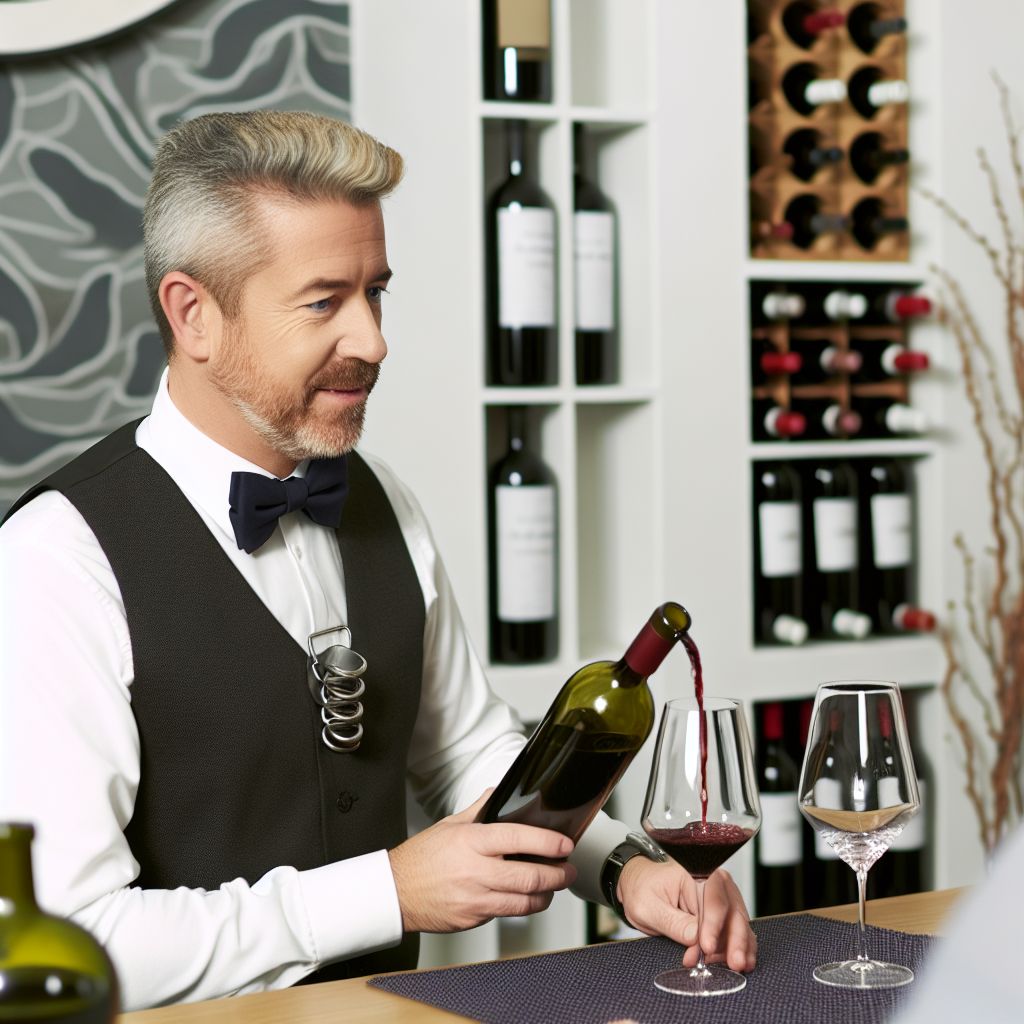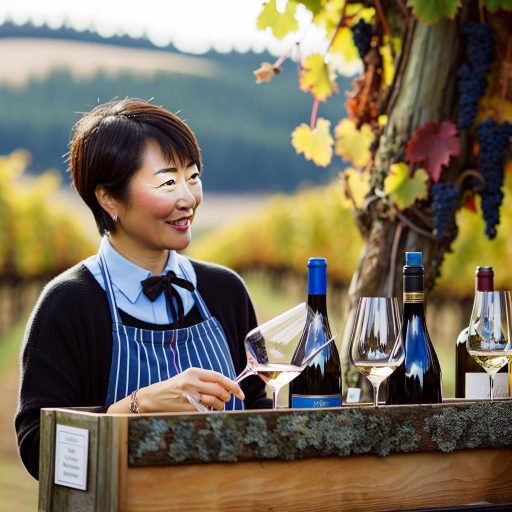The History and Evolution of Sommeliers in Wine Culture
Origins of Sommeliers
The role of sommeliers dates back to ancient times.
Earliest references appear in ancient Roman texts.
These esteemed wine stewards ensured quality for royalty.
During the Middle Ages, their duties expanded significantly.
Sommeliers began overseeing wine storage and service in grand households.
The Rise in Popularity
With the Renaissance, interest in wine surged across Europe.
This period marked the birth of professional wine tasting.
Individuals became passionate about wine regions and their characteristics.
As a result, sommeliers gained recognition for their expertise.
Formal Education and Certification
The 20th century saw professional training programs for sommeliers.
Organizations like the Court of Master Sommeliers emerged globally.
These institutions promote high standards in the profession.
Consequently, the sommelier title became widely respected.
Modern-Day Sommeliers
Today’s sommeliers play crucial roles in restaurants and wineries.
They curate wine lists that enhance dining experiences.
Moreover, their recommendations often help guide patrons’ choices.
In addition, they educate consumers about wine culture.
The Influence of Sommeliers on Wine Culture
Sommeliers bridge the gap between wine producers and consumers.
They share insights into wine history and production methods.
Moreover, they advocate for sustainable wine practices.
As such, their influence extends beyond the dining table.
Ultimately, sommeliers shape the appreciation of wine in society.
The Role of Sommeliers in Fine Dining Establishments
Enhancing the Dining Experience
Sommeliers play a crucial role in enhancing the dining experience.
They select wines that complement the menu perfectly.
Moreover, they provide recommendations tailored to guests’ preferences.
Unlock Your Career Potential
Visualize a clear path to success with our tailored Career Consulting service. Personalized insights in just 1-3 days.
Get StartedThis personalized service elevates the overall ambiance of fine dining establishments.
Wine Education and Stewardship
Sommeliers educate both staff and customers about wine.
They share knowledge about varietals, regions, and food pairings.
This education fosters a deeper appreciation for wine culture.
Additionally, they promote responsible consumption and stewardship.
Curating Wine Lists
Creating an exceptional wine list is a key responsibility of sommeliers.
They carefully select wines based on quality and variety.
Furthermore, they consider the preferences of the target clientele.
A well-curated list enhances the prestige of the restaurant.
Building Relationships with Producers
Sommeliers often build relationships with wine producers.
These connections allow them to source unique bottles.
This exclusivity can attract discerning clients to the establishment.
Moreover, it provides an opportunity for special wine events.
Creating a Wine-Driven Culture
Sommeliers contribute to a wine-driven culture within the restaurant.
They organize tastings and educational events for guests.
Such activities cultivate a community of wine enthusiasts.
Ultimately, this enhances the restaurant’s reputation in the industry.
How Sommeliers Influence Wine Selection and Pairings
The Role of Sommeliers in Restaurants
Sommeliers play a crucial role in modern dining experiences.
They offer expert guidance on wine selection.
Moreover, they help enhance food pairings with suitable wines.
Sommeliers understand the complexities of flavor profiles.
They ensure patrons enjoy the best combinations for their meals.
Personalizing Customer Experience
Sommeliers engage with customers to understand their preferences.
They ask questions regarding taste preferences and dietary restrictions.
This personalized approach creates a memorable dining experience.
Furthermore, sommeliers often recommend lesser-known wines.
This practice educates customers about new wine varieties.
The Influence on Wine List Development
Sommeliers significantly contribute to curating wine lists.
They select wines that reflect the restaurant’s cuisine.
This aspect ensures harmony between food and drink offerings.
Additionally, sommeliers frequently update the wine lists.
Their updates incorporate seasonal selections and new arrivals.
Sommeliers and Wine Education
Sommeliers take on a vital role in educating customers about wine.
They conduct tastings that showcase different varietals.
These tastings enhance customers’ knowledge and appreciation of wines.
Moreover, sommeliers may offer classes or workshops.
These opportunities empower enthusiasts to explore wine further.
Explore Further: Career Growth Opportunities for Front Desk Agents
Educational Requirements and Training for Becoming a Sommelier
Formal Education
Most sommeliers begin their journey with formal education in hospitality or culinary arts.
Many culinary schools offer specialized programs focusing on wine education.
These programs provide a foundational understanding of wine regions, grape varieties, and production methods.
Certification Programs
Certification enhances a sommelier’s credibility in the wine industry.
Organizations such as the Court of Master Sommeliers offer rigorous certification tracks.
These programs cover tasting evaluations and wine pairing techniques.
Other notable certifying bodies include the Wine and Spirit Education Trust (WSET) and the Society of Wine Educators.
Hands-On Experience
Practical experience is vital for aspiring sommeliers.
Many start in entry-level positions in restaurants or wineries to learn the ropes.
They often work closely with experienced wine professionals.
This exposure helps them develop sensory skills and deepen their wine knowledge.
Continuing Education
Wine education doesn’t end with certification.
Sommeliers regularly attend workshops and tastings to stay informed.
They participate in industry events, exploring new trends and vintages.
Staying updated is crucial in a rapidly evolving field.
Soft Skills Development
In addition to technical knowledge, sommeliers need strong communication skills.
They must effectively convey wine selections to customers.
Moreover, they should build rapport and trust with patrons.
Problem-solving and critical thinking play significant roles in their success.
Gain More Insights: Time Management Skills For Spa Managers
The Impact of Sommeliers on Consumer Wine Knowledge and Appreciation
Enhancing Consumer Education
Sommeliers play a crucial role in educating consumers about wine.
They offer detailed information on varietals, regions, and winemaking techniques.
Moreover, they explain the intricacies behind wine flavors and aromas.
This education fosters a deeper understanding of wine among consumers.
As a result, appreciation for wine culture grows significantly.
Personalized Recommendations
Sommeliers provide tailored wine recommendations for different palates.
They consider factors such as meal pairings and personal preferences.
This personalized approach encourages consumers to explore new options.
Consequently, consumers develop their own unique tastes and preferences.
Establishing Trust in Wine Selection
Consumers often feel overwhelmed by countless wine options.
Sommeliers help to demystify this process through their expertise.
By guiding selections, they create a sense of trust in wine purchases.
Many consumers return to restaurants based on their sommelier’s advice.
This trust enhances the overall dining experience and wine enjoyment.
Influencing Trends
Sommeliers also play a significant role in shaping wine trends.
They curate wine lists that highlight emerging wineries and grape varieties.
This influences consumer preferences and purchasing behavior.
Additionally, sommeliers often participate in tastings and events to promote new wines.
Such initiatives keep consumers engaged in the evolving wine landscape.
Building a Community of Wine Enthusiasts
Sommeliers cultivate communities around the love of wine.
They organize tastings and educational events to foster connections.
This community engagement encourages consumers to learn and share knowledge.
As a result, wine culture becomes more accessible to everyone.
Sommeliers significantly impact modern wine appreciation and culture.
Learn More: The Role of a Sommelier in Enhancing Guest Experiences
Sommeliers and the Rise of Wine as a Cultural Phenomenon
Understanding the Role of Sommeliers
Sommeliers significantly influence modern wine culture.
They bridge the gap between wine producers and consumers.
These professionals enhance dining experiences with their expertise.
By recommending food pairings, they elevate the culinary experience.
Furthermore, they educate consumers about different wine regions.
The Growth of Wine Tourism
Wine tourism has surged in popularity over recent years.
Sommeliers play a crucial role in this trend.
They guide visitors through tastings and vineyard tours.
Moreover, they share stories that connect tourists to the wine’s origin.
This engagement fosters a deeper appreciation for wine culture.
Promoting Wine Education
Sommeliers actively promote wine education through various channels.
They conduct classes and tastings to enhance consumer knowledge.
Additionally, they offer insights on wine selection and storage.
Their expertise demystifies wine, making it more accessible.
Consequently, more people are exploring diverse wine options.
Sommeliers as Cultural Ambassadors
Sommeliers serve as ambassadors for their regions’ wines.
They showcase unique characteristics of local vineyards.
Through curated wine lists, sommeliers spotlight emerging producers.
This support reinforces local wine communities and promotes sustainability.
Thus, sommeliers contribute to the preservation of wine heritage.
The Impact on Social Norms
Sommeliers influence the social etiquette surrounding wine consumption.
They advocate for responsible drinking and appreciation.
An informed sommelier helps dispel common wine myths.
Also, they encourage consumers to experiment with diverse varietals.
This shift enriches conversations around wine in social settings.
Discover More: Spa Manager Salary Expectations In Canada

The Role of Technology in Modern Sommelier Practices
Embracing Advanced Tools
Today’s sommeliers utilize various advanced tools to enhance their craft.
Technological innovations allow them to analyze wine with precision.
For instance, software programs can track individual wine profiles effectively.
Apps enable sommeliers to manage extensive wine lists seamlessly.
Additionally, virtual reality experiences provide immersive wine education opportunities.
Data-Driven Decision Making
Data analytics significantly impacts how sommeliers evaluate wines.
They can use customer preferences to tailor wine selections.
Furthermore, analytical tools help predict trends in wine consumption.
This data-driven approach enhances the overall guest experience.
Consequently, sommeliers can recommend wines with greater confidence.
Enhancing Customer Engagement
Technology improves the way sommeliers engage with customers.
Social media platforms allow them to share insightful wine content.
Sommeliers can interact with a broader audience online.
Moreover, mobile apps help customers discover wine pairings effortlessly.
This fosters a stronger connection between consumers and the wine community.
Training and Education Advancements
Technology also plays a critical role in sommelier training and education.
Online courses provide accessible learning for aspiring sommeliers.
Interactive webinars and virtual tastings enhance knowledge sharing.
As a result, sommeliers can continually refine their skills.
This commitment to education benefits the entire wine industry.
Sommeliers and Sustainability
Promoting Eco-Friendly Wine Choices
Sommeliers play a vital role in contemporary wine culture.
They champion eco-friendly wine choices with great enthusiasm.
As environmental concerns rise, their influence grows stronger.
Many sommeliers focus on sustainable wine producers.
They emphasize the importance of organic and biodynamic practices.
In doing so, they help consumers make informed decisions.
Education becomes a key component of their advocacy.
For instance, sommeliers often conduct tastings featuring sustainable wines.
This approach introduces consumers to distinctive flavors.
Moreover, sommeliers share knowledge about the environmental impact of wine production.
They discuss topics like water conservation and soil health.
This promotes a deeper understanding of wine’s ecological footprint.
Building Relationships with Sustainable Wine Producers
Sommeliers often cultivate strong relationships with farmers and winemakers.
They seek producers committed to sustainable practices.
These connections foster collaboration for eco-friendly initiatives.
Additionally, sommeliers support local wineries emphasizing sustainable growth.
As a result, they encourage consumers to explore regional wines.
This not only enhances flavor appreciation but also bolsters local economies.
Encouraging Consumer Awareness
Consumer awareness is essential for promoting sustainable wine choices.
Sommeliers actively engage in conversations about eco-friendly wines.
They use social media platforms to spread their message.
Furthermore, they organize events highlighting sustainable options.
Through these efforts, they inspire consumers to ask questions.
Ultimately, this encourages a shift in purchasing habits.
As consumers demand sustainability, producers will respond accordingly.
Contributing to a Sustainable Future
Sommeliers aspire to shape a more sustainable wine culture.
They act as advocates for practices that protect the environment.
This commitment impacts future generations of wine enthusiasts.
Moreover, their efforts promote energy-efficient winemaking techniques.
For example, many now use solar energy in their production processes.
Furthermore, reducing packaging waste becomes a priority among sommeliers.
Through these initiatives, they set a standard for the industry.
Their influence ultimately leads to a healthier planet for all.
The Future of Sommeliers in the Changing Landscape of the Wine Industry
Shifting Consumer Preferences
Consumer preferences continue to evolve in today’s wine market.
More people now seek personalized experiences over traditional tastings.
Sommeliers must adapt by curating unique selections for their clients.
Additionally, they need to stay informed about emerging wine regions.
Embracing Technology
Technology is transforming the role of sommeliers significantly.
Many wine enthusiasts now use apps to gain knowledge about wine.
Therefore, sommeliers can enhance their services by integrating technology.
Virtual tastings have emerged as a popular alternative to in-person events.
Educational Initiatives
Educating consumers about wine is more critical than ever.
Sommeliers play a vital role in these educational initiatives.
Workshops and classes offer opportunities for hands-on learning.
By sharing their expertise, they foster a deeper appreciation for wine.
Collaboration with Winemakers
Partnerships between sommeliers and winemakers are increasingly beneficial.
These collaborations can bring innovative products to the market.
Moreover, they allow sommeliers to deepen their understanding of the wine-making process.
This insight ultimately enhances their ability to recommend wines.
Sustainability Trends
Sustainability is taking center stage in the wine industry.
Sommeliers must be knowledgeable about eco-friendly practices.
They can advocate for sustainable producers and promote organic wines.
This approach aligns with the values of environmentally conscious consumers.
Global Perspectives
The global nature of the wine industry creates exciting opportunities.
Sommeliers are increasingly exposed to diverse wine cultures.
They can offer unique insights into international wine regions.
This knowledge enhances the wine experience for consumers everywhere.




